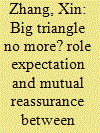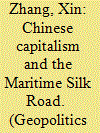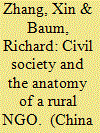|
|
|
Sort Order |
|
|
|
Items / Page
|
|
|
|
|
|
|
| Srl | Item |
| 1 |
ID:
192957


|
|
|
|
|
| Summary/Abstract |
I examine how mutual perception and role expectation evolve over time between China and Russia on each other's position in the international system and on bilateral relations in the context of shifting perceptions of the "Big Triangle" between the United States, Russia, and China since the late 1990s. Building on Role Theory in international relations, I use official texts, and experts' opinions during a series of key policy episodes to demonstrate that constantly adjusting role expectations and role enactment has become an important part of official Sino-Russian inter-state relations. Such relations have evolved from a more conservative, mutual role expectation of "do-no-harm" to more proactive expectations of joint efforts and policy coordination. This changing role expectation comes along with mutual reassurance against role mismanagement when both seek to substantiate the role of "significant others" beyond traditional military allies. During the 2010s, Sino-Russian bilateral relations started to be increasingly shaped by a discussion about the salience of US-China-Russia "Big Triangle."
|
|
|
|
|
|
|
|
|
|
|
|
|
|
|
|
| 2 |
ID:
153519


|
|
|
|
|
| Summary/Abstract |
As China tries to catch up from a semi-peripheral status in the hierarchy of a capitalist world-system, three decades of fast economic growth have recently shown serious signs of capital glut, overproduction and decreasing returns to capital, indicating the beginning of a phase of contraction and stagnation in the long-cycles of capitalist accumulation. The combination of “capital logic” and “territorial logic” in Giovanni Arrighi’s framework gives both the Chinese state and Chinese capital strong incentives and pressure to actively engage in a “spatial fix” by reconfiguring its geographic vision in order to further capital accumulation and expansion on a larger spatial dimension, culminating in the “One Belt, One Road” Initiative, including the Maritime Silk Road Initiative (MSRI). The official promotion of the MSRI hopes to revitalise the historical precedents of the “Silk Road” so that the modern-day hyper-connectivity across Asia, Africa and Europe will facilitate the formation of a China-led reorganised world economy, operating under open and equal participation, possibly leading to common development for all countries involved. However, the nature and impact of such a grandiose initiative, especially its core mission of “connectivity”, is still highly contingent on the hybrid nature of Chinese capitalism in the world-system and how China engages capitalism at the global scale.
|
|
|
|
|
|
|
|
|
|
|
|
|
|
|
|
| 3 |
ID:
053781


|
|
|
| 4 |
ID:
154820


|
|
|
|
|
| Summary/Abstract |
Empowered by the media, legislations in China have, over recent years, been increasingly influenced by public focusing events. Many national legislations have been triggered by public focusing events, rather than being entirely pre-determined by the Party or by the government. After a detailed empirical study of 132 public focusing events and national legislations between 2003 and 2016, the article explores the features, the reasons, and the advantages and disadvantages of legislations triggered by public focusing events. In these ‘pressure-induced legislations’, the public focusing events serve as catalysts that create a new consensus or demand for new laws and regulations that are enacted over a short period of time, thereby influencing the national legislation. Compared to traditional Chinese legislations, pressure-induced legislations are more efficient and more responsive to the needs of the general public, but they also carry the danger of irrational judgments being made, leading to the enactment of improper laws or regulations.
|
|
|
|
|
|
|
|
|
|
|
|
|
|
|
|
| 5 |
ID:
115677


|
|
|
|
|
| Publication |
2012.
|
| Summary/Abstract |
As energy consumption is closely related to all aspects of human life, it becomes the standard by which to measure people's quality of life and the national development level. Based on the "energy ladder" hypothesis, we conducted questionnaire surveys in the Western Loess Plateau of China, and accessed a considerable amount of information about the energy usage of rural and urban households. The results show that the per capita effective heat is 323.3, 282.8, 250.0 and 123.6 kgce in the provincial capital, medium-sized cities, county towns and rural areas, respectively. The energy ladder feature is obvious. Using 719 sample data, the multiple regression analysis was conducted between per capita effective heat and two independent variables including per capita income and the attributes of energy used, the parameter estimation of the cross-quadratic model produced more significant effects. The three-dimensional graph clearly shows the differences in living standards and survival status between urban and rural households. High-income residents in urban areas consume more high-quality energy, they enjoy an affluent lifestyle. While low-income households in rural areas obtain less effective heat, and use poor quality fuels, they are still at the level of basic survival.
|
|
|
|
|
|
|
|
|
|
|
|
|
|
|
|
|
|
|
|
|